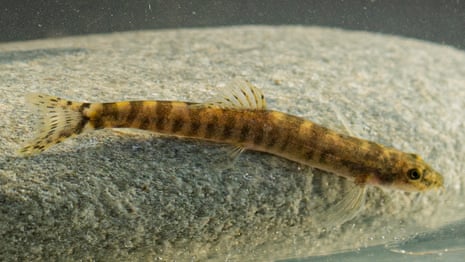A freshwater fish that scientists thought was extinct has been found in south-east Turkey, after an absence of nearly 50 years.
“I’ve been researching this area for 12 years and this fish was always on my wishlist,” said Dr Cüneyt Kaya, associate professor at Recep Tayyip Erdoğan University. “It’s taken a long time. When I saw the distinctive bands on the fish, I felt so happy. It was a perfect moment.”
The critically endangered Batman River loach (Paraschistura chrysicristinae), a tiny yellow-and-brown striped fish which grows to a maximum length of 3.6cm (1.4 inches), was previously found in streams and tributaries of the Batman and Ambar rivers, where it was last seen in 1974.
Kaya, a fish taxonomist, and Dr Münevver Oral, a geneticist and research fellow at the same university, focused their search for the loach upstream of the Batman Dam, which was built between 1986 and 1999. “Because the species was lost, we couldn’t know the original natural habitat, so we weren’t sure where to search,” said Kaya. “The species is also very small and cylindrical, so the nets’ mesh needed to be smaller. Earlier, we used larger nets and I think the fish went through the nets, so we didn’t find it.”
Using tight-weave nets, Kaya and Oral found 14 loaches in shallow, rocky, fast-flowing areas of the Sarim stream and another nine in the Han stream. The fish’s size may have counted in its favour. “We’re lucky, because this species has no economic value whatsoever,” said Oral. “If we were talking about big trout, people like to go fishing. People usually think about fish they can consume. But the Batman River loach is so tiny. Local people say to us: ‘Is this why you came all this way, just to find this?’”
More work is now needed to help secure the loach’s future, including examining possible threats, such as populations fragmented by the dam, drought (which has been particularly bad in Turkey in 2021) and pollution. “Man-made pollution is an issue, so we need to increase the awareness of local people,” said Oral. “The dam construction is another threat. There could also be invasive species. We don’t know the ecology of the species, so we need to do more research.”
Kaya and Oral’s expedition was supported by conservation organisations Shoal and Re:wild, as part of their global Search For The Lost Fishes project. The Batman River loach is the first fish to be found on their list of 10 “most wanted” lost species, which also includes the fat catfish (Rhyzosomichthys totae) in Colombia’s high-altitude Lake Tota and the duckbilled buntingi (Adrianichthys kruyti) in Lake Poso, Indonesia.
“Freshwater fish matter to millions of people around the world who rely on them for daily survival,” said Mike Baltzer, executive director of Shoal. “There are over 18,000 species of fish. They’re important for biodiversity and for climate change, and a perfect indicator of the health of rivers and lakes we depend on for survival. Once these fish are found, work needs to be done to save the species.”
According to the World’s Forgotten Fishes report, which WWF, Shoal and other partners published this year, freshwater fish face severe threats.
“Freshwater fishes are considered the most threatened group of fauna on the planet,” said Baltzer. “More than a third of freshwater fish species are threatened with extinction. Freshwater fish need more attention – we need to conserve rivers and lakes.
“It’s very exciting to find a species like the Batman River loach that was thought to be extinct. [It shows] that if we focus our minds and efforts, we can find other species and stop the extinctions of fish.”
Find more age of extinction coverage here, and follow biodiversity reporters Phoebe Weston and Patrick Greenfield on Twitter for all the latest news and features
